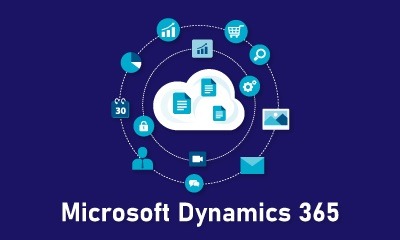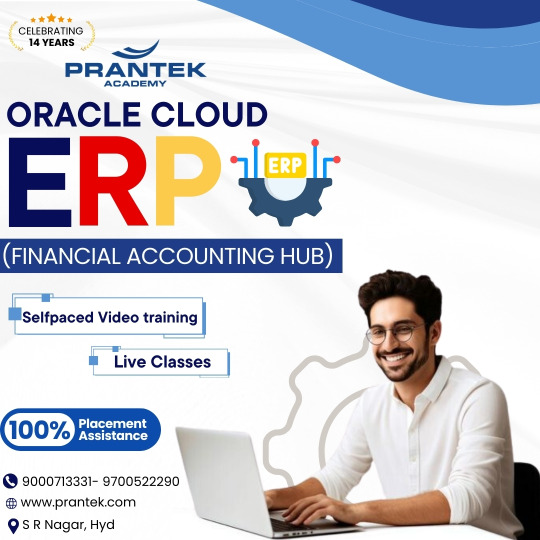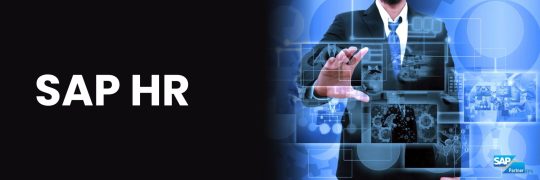#ERPTraining
Explore tagged Tumblr posts
Text
High-Paying Career Opportunities for Oracle Fusion Financials Professionals.

Oracle Fusion Financials is a leading cloud-based financial management solution that integrates comprehensive financial applications with cutting-edge technology. As businesses increasingly migrate to cloud-based ERP solutions, professionals skilled in Oracle Fusion Financials are in high demand. This demand translates into lucrative career opportunities across industries. Let’s explore some of the top high-paying career paths for Oracle Fusion Financials professionals.
1. Oracle Fusion Financials Consultant
Average Salary: $90,000 – $150,000 per year
Oracle Fusion Financials Consultants help organizations implement and optimize Oracle Fusion Financials modules. They analyze business requirements, configure the system, and provide training to end-users. This role requires deep knowledge of financial processes and Oracle Cloud applications.
Key Responsibilities:
Implementing Oracle Fusion Financials solutions
Customizing financial modules to align with business needs
Training and supporting end-users
Troubleshooting system issues and optimizing performance
2. Oracle Fusion Financials Functional Lead
Average Salary: $100,000 – $160,000 per year
A Functional Lead is responsible for leading the implementation of Oracle Fusion Financials solutions for enterprises. They work closely with stakeholders to ensure smooth adoption and integration.
Key Responsibilities:
Leading Oracle Fusion Financials implementation projects
Coordinating between business and technical teams
Ensuring compliance with financial regulations
Managing project timelines and deliverables
3. Oracle Fusion Financials Technical Consultant
Average Salary: $95,000 – $145,000 per year
Technical Consultants focus on the technical aspects of Oracle Fusion Financials, including integrations, customizations, and troubleshooting. They need strong programming skills and an understanding of Oracle tools like SQL, PLSQL, and BI Publisher.
Key Responsibilities:
Developing custom reports and dashboards
Integrating Oracle Fusion Financials with other enterprise systems
Resolving technical issues and optimizing system performance
Automating financial processes through scripting and configuration
4. Oracle Cloud ERP Finance Solution Architect
Average Salary: $120,000 – $180,000 per year
Solution Architects design and oversee the deployment of Oracle Fusion Financials solutions, ensuring they align with an organization's strategic goals. This senior role requires deep expertise in ERP systems and financial processes.
Key Responsibilities:
Designing end-to-end Oracle Fusion Financials solutions
Providing strategic guidance on financial transformations
Ensuring system scalability and security
Collaborating with executives and IT teams
5. Oracle Fusion Financials Business Analyst
Average Salary: $85,000 – $140,000 per year
Business Analysts bridge the gap between business needs and Oracle Fusion Financials capabilities. They analyze financial processes, gather requirements, and help optimize system usage.
Key Responsibilities:
Conducting business process analysis and recommending improvements
Gathering and documenting system requirements
Coordinating with technical teams for system enhancements
Supporting financial reporting and data analysis
6. Oracle Fusion Financials Project Manager
Average Salary: $110,000 – $170,000 per year
Project Managers oversee the implementation and integration of Oracle Fusion Financials in an organization. They ensure projects are delivered on time, within budget, and meet business objectives.
Key Responsibilities:
Managing end-to-end Oracle Fusion Financials projects
Coordinating with functional and technical teams
Monitoring project risks and implementing mitigation strategies
Ensuring stakeholder alignment and satisfaction
7. Oracle Fusion Financials Trainer
Average Salary: $80,000 – $130,000 per year
With the rising demand for Oracle Fusion Financials professionals, training and coaching have become a lucrative career path. Trainers help individuals and organizations upskill in Oracle Cloud Financials.
Key Responsibilities:
Conducting training sessions on Oracle Fusion Financials modules
Developing course materials and hands-on exercises
Assisting learners with real-world financial scenarios
Keeping up-to-date with the latest Oracle Cloud updates
Conclusion
Oracle Fusion Financials professionals have numerous high-paying career opportunities across various industries. With businesses increasingly adopting Oracle Cloud solutions, expertise in this domain can lead to rewarding job roles with excellent salary potential. Investing in training and certification in Oracle Fusion Financials can significantly enhance career prospects and open doors to leadership positions in the financial and ERP sectors.Are you looking to kickstart your career in Oracle Fusion Financials? Enroll in a structured training program to gain in-depth knowledge and hands-on experience, ensuring you are well-prepared for these lucrative roles. To Your bright future join Oracle Fusion Financials.
#erptree#jobguarantee#oraclefusion#oraclefusionfinancials#100jobguarantee#hyderabadtraining#financecareers#erptraining#financejobs#careergrowth
0 notes
Text
🚀Join Our #FreeDemo Session – Level Up Your Skills Today!🎯

🔗Demo Link: https://meet.goto.com/408862389
🎓Attend online our exclusive demo on #D365ProjectManagementAccounting by Mr. Akash 👨🏫
📅 Demo On: 18th Feb, 2025 ⏰ @ 8:00 PM IST
📱 Contact us: +91 7032290546
🟢WhatsApp: https://wa.me/c/917032290546
🌐 Visit: https://www.visualpath.in/Top-Project-Management-Courses-Online-accounting-dynamics-365.html
💡 What You’ll Gain from This Training: ✅ Finance & Accounting Professionals 🏗️ ✅ Project Managers 📊 ✅ ERP & Dynamics 365 Consultants ☁️ ✅ IT & System Administrators 🎥 ✅ Students & Freshers Looking for ERP Careers 💼
✅Microsoft, Dynamics CRM, Functional, Finance, PowerApps 💼
#D365#Dynamics365#MicrosoftDynamics#ERP#CloudERP#D365ProjectManagement#D365Accounting#ProjectAccounting#D365Finance#ProjectManagementERP#OnlineTraining#SkillUpgrade#CareerGrowth#ERPTraining#MicrosoftTraining
0 notes
Text
Mastering D365: The Ultimate Guide to Professional Training Services
In today's rapidly evolving business environment, leveraging the right technology is essential for companies striving for success. One such game-changing tool is Microsoft Dynamics 365 (D365), a powerful suite of cloud-based business applications designed to streamline operations and enhance customer engagement. However, implementing and maximizing D365’s capabilities requires a skilled workforce. This is where professional training services come into play, ensuring your team is equipped with the knowledge and expertise to harness the full potential of D365.

Why D365 Training is Essential Microsoft Dynamics 365 is a comprehensive platform that integrates enterprise resource planning (ERP) and customer relationship management (CRM) into one cohesive system. It covers everything from financial management and supply chain optimization to sales, marketing, and customer service. Given its vast capabilities, it can be challenging for organizations to use the platform to its full potential without proper training.
Without effective training, employees might struggle with utilizing D365 to its full extent, leading to inefficiencies, errors, and, ultimately, a lack of return on investment (ROI). Professional training ensures that your team is not only proficient in using the platform but can also take advantage of advanced features to improve business performance.
The Benefits of Professional D365 Training Services Boost Efficiency and Productivity A well-trained team can navigate D365 with ease, allowing them to complete tasks more quickly and accurately. Proper training equips employees with the tools they need to automate processes, streamline workflows, and reduce time spent on manual data entry. As a result, your organization can operate more efficiently, saving both time and resources.
Improve User Adoption When employees understand how D365 can make their jobs easier and more effective, they are more likely to embrace the platform. Training helps to address any initial resistance or frustration that might arise from using a new system. With professional guidance, employees will feel more confident in their ability to use D365, leading to higher user adoption rates.
Maximize ROI Organizations invest significant resources into implementing D365, so it’s essential to get the best possible return on that investment. Professional training services ensure that your team is well-versed in the software’s capabilities, enabling them to leverage it fully. By utilizing all the features available, your company can achieve greater productivity, better customer service, and improved decision-making.
Customization and Scalability D365 is highly customizable, allowing businesses to tailor it to their specific needs. Professional training services often include guidance on customizing the platform to suit your organization’s unique requirements. Furthermore, as your business grows, the software can scale to accommodate your evolving needs. With training, your team will be prepared to handle future changes and expansions, ensuring that D365 continues to support your growth.
Stay Ahead of Industry Trends D365 is continuously updated with new features and enhancements. Professional training services ensure that your team stays current with the latest updates, enabling them to take advantage of new tools and innovations. This proactive approach helps your organization maintain a competitive edge by utilizing the most advanced solutions available.
Key Components of Professional D365 Training Services To maximize the benefits of D365 training, it’s crucial to choose a service that covers all essential aspects of the platform. Here’s what to look for:
Role-Based Training D365 offers a wide range of functionalities, and different employees will use the platform for different purposes. Role-based training tailors the learning experience to the specific needs of each user. For example, finance teams may need to focus on financial management, while sales teams will benefit from training on customer relationship management. Tailoring the training ensures that employees are learning the most relevant skills for their specific roles.
Hands-On Experience While theoretical knowledge is important, hands-on experience is crucial for mastering D365. Professional training services often include practical exercises that allow employees to work within the platform, simulating real-world scenarios. This hands-on approach helps users become comfortable navigating D365 and applying what they’ve learned to their day-to-day tasks.
Expert Instructors To get the most out of training, it’s essential to learn from experienced professionals who have deep knowledge of D365. Expert instructors can provide valuable insights, answer questions, and offer tips and tricks that might not be available through standard documentation. Look for training providers with certified instructors who have real-world experience with D365 implementation and usage.
Ongoing Support and Resources Training shouldn’t stop once the course is over. A reputable training service will offer ongoing support to ensure that employees continue to succeed as they use D365. This might include access to additional resources, online communities, and troubleshooting assistance. Continuous learning and support ensure that your team stays up-to-date with any changes or challenges that may arise.
Choosing the Right Training Service When selecting a professional training provider, consider the following factors:
Reputation and Expertise: Look for providers with a proven track record in delivering high-quality D365 training. Reading reviews and speaking with other organizations that have used the service can provide valuable insights.
Customization: Ensure that the training can be tailored to meet the specific needs of your business and team members.
Training Format: Determine whether the provider offers in-person, virtual, or hybrid training options, and choose one that fits your team’s preferences and schedules.
Post-Training Support: Find out what kind of ongoing support is available to your team once the training is completed.
Conclusion Mastering Microsoft Dynamics 365 is an essential step toward improving your business’s operations and driving growth. By investing in professional D365 training services, you ensure that your team is equipped with the skills they need to fully harness the platform’s potential. With the right training, your organization can boost productivity, increase user adoption, and maximize ROI—all while staying ahead of industry trends. Don’t leave the power of D365 untapped—unlock its full potential with expert training today!
Contact Us Optimum Technology Transfer Ltd 104 The Leather Market 11-13 Weston Street London SE1 3ER
0 notes
Text
Why ERP Training is Crucial for Business Efficiency

In today's competitive and technology-driven business landscape, organizations are increasingly adopting Enterprise Resource Planning (ERP) systems to streamline operations, improve decision-making, and enhance productivity. However, having an ERP system in place is not enough. To truly unlock its potential, businesses must invest in ERP training for their teams. Here’s why ERP training is crucial for improving business efficiency:
1. Maximizing the Full Potential of the ERP System
An ERP system is designed to consolidate data from various business functions into one unified platform. But if employees don’t know how to use the system effectively, they may fail to take advantage of its full capabilities. ERP training ensures that employees understand how to use the system to its fullest, maximizing its potential to improve efficiency across all departments.
Proper usage: Training equips employees with the skills needed to navigate the ERP interface, run reports, and enter data accurately, which enhances overall system utility.
Advanced features: Many ERP systems come with sophisticated features, such as predictive analytics, automation, and real-time data updates. Proper training ensures employees can use these features to make data-driven decisions and improve operational performance.
By providing training, businesses can ensure that the system’s capabilities align with the organization’s specific needs, ultimately improving efficiency and workflow optimization.
2. Reducing Errors and Mistakes
One of the most significant risks in any business is human error. Inaccurate data entry, missed steps, or misinterpreted reports can lead to costly mistakes. Without proper ERP training, employees may not fully understand the importance of accurate data entry, leading to errors that can disrupt business operations.
Training helps employees:
Understand system processes: They’ll know exactly how to input data correctly, run automated processes, and follow protocols, significantly reducing the chance of mistakes.
Identify and fix errors: Employees who are well-trained can spot errors before they escalate, ensuring that the business maintains accurate data across all functions.
By minimizing errors, ERP training directly impacts data accuracy, which is essential for making informed decisions, maintaining customer satisfaction, and ensuring smooth operations.
3. Streamlining Workflows and Boosting Productivity
ERP systems are designed to automate many manual tasks and streamline workflows across departments, such as finance, sales, human resources, and inventory management. However, if employees aren’t familiar with how to navigate and utilize these automation features, they may not experience the time-saving benefits that come with ERP systems.
With the right training:
Automated processes: Employees can automate repetitive tasks like order processing, invoicing, or inventory tracking, freeing up valuable time for higher-value work.
Faster decision-making: By learning how to access and interpret real-time data, employees can make quicker, more informed decisions, which increases business agility.
Reduced manual effort: Automation helps reduce the need for manual intervention, leading to fewer bottlenecks, faster task completion, and more efficient resource allocation.
Training employees on how to fully leverage workflow automation and data integration through ERP systems can dramatically increase business productivity.
4. Enhancing Cross-Department Collaboration
ERP systems break down silos by integrating data from multiple departments, creating a unified view of business operations. For cross-departmental collaboration to be effective, all employees need to understand how to access and share relevant information from the system.
With comprehensive ERP training:
Smooth information flow: Employees in different departments, such as finance, sales, and inventory management, can easily access the data they need, leading to better coordination and decision-making.
Unified processes: Teams can work together more effectively because they have shared access to a single source of truth, eliminating confusion and potential miscommunication.
Better resource allocation: Collaboration is key to ensuring that resources are allocated effectively across departments, helping the business optimize performance.
ERP training fosters a collaborative work environment by ensuring that employees from different functions can use the same system and work seamlessly together.
5. Improved Reporting and Data Analysis
One of the key advantages of an ERP system is its ability to generate real-time reports and offer data analytics that can help businesses make informed decisions. However, if employees don’t understand how to interpret or extract the right data, they may miss out on valuable insights that could drive better decision-making.
ERP training provides employees with the tools they need to:
Create customized reports: Training helps employees understand how to generate reports that are specific to their department or business function, improving data-driven decision-making.
Analyze trends: Employees can use the ERP system to identify trends, track KPIs, and forecast future performance, allowing businesses to adjust their strategies accordingly.
Monitor performance: With real-time dashboards and performance tracking, trained employees can quickly identify areas where improvements are needed and take action before issues become problems.
By improving data reporting and analysis, businesses can gain insights that help optimize processes, reduce waste, and boost profitability.
6. Ensuring System Security and Compliance
ERP systems house sensitive data, including financial records, customer information, and employee data. If employees are not trained on how to properly access and protect this information, businesses may face security breaches or compliance issues, leading to reputational damage and legal consequences.
Proper ERP training ensures that employees:
Follow security best practices: Training covers how to set strong passwords, control access permissions, and adhere to security protocols to safeguard sensitive information.
Comply with regulations: Many industries have specific compliance requirements (such as GDPR or HIPAA). Well-trained employees will understand how to input and store data in a way that meets these legal standards.
Prevent fraud: Employees who understand the system’s security features can identify potential fraud risks and take preventive measures to protect the organization.
Training helps to ensure that the business is not only secure but also compliant with industry regulations, reducing the risk of costly fines or data breaches.
7. Maximizing ROI from ERP Investment
Implementing an ERP system is a significant financial investment. However, without proper training, businesses may not fully capitalize on the system's capabilities, leading to lower-than-expected returns.
When employees are trained to use the ERP system efficiently:
Faster ROI: The business will see a quicker return on investment as employees become proficient in using the system and are able to improve processes and productivity.
Reduced training costs: Proper initial training can minimize the need for ongoing support and troubleshooting, saving the company money in the long run.
Optimized features: Employees will be able to take full advantage of the ERP’s advanced features, such as analytics tools, automation, and customized workflows, ensuring that the system delivers its maximum value.
Investing in ERP training maximizes the value of your ERP system and accelerates the time it takes to realize a positive return.
Conclusion: ERP Training as a Key to Business Efficiency
In today’s digital world, ERP systems are vital tools for organizations that want to streamline their operations, improve collaboration, and make data-driven decisions. However, to achieve the full benefits of an ERP system, businesses must prioritize ERP training for their employees. With the right training, businesses can improve efficiency, reduce errors, enhance collaboration, optimize decision-making, and ultimately maximize their return on investment. Investing in ERP training is one of the most effective ways to ensure that your organization thrives in an increasingly competitive and fast-moving business landscape.
0 notes
Text
🚀 Start Your SAP IS-Retail Journey Today!
Dive into the world of SAP IS-Retail with our comprehensive course designed for beginners and professionals. Learn how to manage retail operations effectively and gain the skills needed to excel in the retail ERP domain.
youtube
Learn from industry experts with 12+ years of experience.
Get hands-on training with step-by-step guidance.
Perfect for anyone looking to grow their career in SAP retail solutions.

Click on Enroll button and fill the form to get more details about the course.
#SAPISRetail#LearnSAP#RetailERP#SAPTraining#ISRetailCourse#RetailSolutions#ERPTraining#CareerGrowth#SAPOnlineCourse#RetailManagement
#SAPISRetail#LearnSAP#RetailERP#SAPTraining#ISRetailCourse#RetailSolutions#ERPTraining#CareerGrowth#SAPOnlineCourse#RetailManagement#Youtube
0 notes
Text

With 14 years of expertise, Prantek Academy offers specialized training in Oracle Cloud ERP (Financial Accounting Hub), backed by 100% placement assistance. Join us to gain in-depth knowledge and secure a promising career in ERP! For more details, click here!
#OracleERPTraining#OracleTraining#ERPTraining#OracleFusion#OracleCloud#ERPImplementation#OracleCertification#BusinessSoftwareTraining#ERPExperts#OracleConsulting#KnowledgeEnhancement#CoursePrograms#CertifiedTraining#StudentSuccess#WorkforceDevelopment#SkillBuilding
0 notes
Text
Master SAP EWM & Unlock Global Supply Chain Opportunities!
Take control of your career with SAP EWM Course in Pune! Learn from the experts and gain practical knowledge to secure jobs offering up to 24 LPA. Our flexible learning approach, combined with certification and 100% placement support, ensures you stand out in global supply chain management!
#SAPEWM#SupplyChainManagement#LearnSAP#TechCareers#SAPCertification#GlobalJobs#CareerInSAP#24LPAJobs#ERPTraining#FlexibleLearning
0 notes
Text

Looking for comprehensive ERP SAP HR training in Noida? APTRON Solutions offers industry-aligned courses designed to equip you with the skills required to excel in the growing field of SAP Human Resource (HR) management. With hands-on training, expert instructors, and a tailored curriculum, APTRON Solutions ensures that you’re job-ready upon completing the course.SAP HR (also known as SAP Human Capital Management) is one of the core modules of SAP that focuses on automating and streamlining various HR processes such as payroll, personnel management, time management, and recruitment. Learning SAP HR offers numerous advantages:
#SAPTraining#ERPTraining#SAPHumanResources#NoidaTraining#APTRONSolutions#SAPHR#HRTraining#SkillDevelopment#CareerOpportunities
0 notes
Text
SAP training equips individuals with the skills needed to effectively utilize SAP software for various business functions, including enterprise resource planning, finance, human resources, supply chain management, and more. Through comprehensive courses led by experienced instructors, participants gain hands-on experience and theoretical knowledge to optimize business processes and drive organizational efficiency.
1 note
·
View note
Text

In the dynamic landscape of enterprise resource planning (ERP), mastering SAP Supplier Relationship Management (SRM) is pivotal for organizations aiming to streamline procurement processes and enhance supplier collaboration. Nestled in the heart of Noida, the SAP SRM Institute in Noida at ERP Noida emerges as a beacon for professionals seeking comprehensive training in this critical SAP module.
#SAPSRM#ERPTraining#NoidaEducation#SAPInstitute#ProcurementExcellence#CareerDevelopment#TechEducation#SAPMastery
1 note
·
View note
Text
Career Success with Bassam Infotech's Odoo ERP
Unlock your potential and pave the way for a successful career transformation with Bassam Infotech, your trusted partner for Odoo ERP solutions.

#OdooSolutions#ERPExcellence#BusinessOptimization#StreamlineProcesses#EfficiencyBoost#BusinessSoftware#TechInnovation#ERPExperts#CodeMasters#SoftwareSolutions#TechInnovators#CodingGenius#CustomizationPros#TechSavvy#ProblemSolvers#InnovationMinds#OdooTrainees#ERPTraining#LearningOdoo#FutureDevelopers#CodingJourney#SkillBuilding#TechApprentices#OdooLearning#CareerBoost#SoftwareTrainees#ProjectLeadership#ManagementMastery#TeamCoordination#strategicplanning
0 notes
Text
Understanding Financial Modules in Oracle Fusion Cloud: A Deep Dive.

Introduction
Oracle Fusion Cloud Financials is a comprehensive suite of financial management applications that enables businesses to streamline their financial operations, improve decision-making, and ensure regulatory compliance. It integrates essential financial functions such as accounting, asset management, procurement, and revenue management, providing a unified and intelligent approach to managing an organization’s financial health.
In this article, we will take a deep dive into the core financial modules of Oracle Fusion Cloud, exploring their functionalities and benefits.
1. General Ledger (GL)
Overview
The General Ledger (GL) module is the backbone of Oracle Fusion Financials. It provides a real-time, centralized view of financial data, ensuring accurate financial reporting and control.
Key Features
Multi-dimensional reporting for in-depth financial analysis
Automated journal processing and reconciliations
Multi-currency and multi-GAAP compliance
Role-based dashboards and analytics
Benefits
Provides real-time insights into financial performance
Enhances compliance with automated controls
Reduces manual effort in financial consolidation
2. Accounts Payable (AP)
Overview
The Accounts Payable module manages supplier invoices, payments, and approvals to optimize cash flow and maintain good supplier relationships.
Key Features
Automated invoice matching and approval workflows
Integration with procurement for seamless processing
AI-driven anomaly detection for fraud prevention
Self-service supplier portal for invoice tracking
Benefits
Improves payment accuracy and reduces processing time
Enhances supplier collaboration with self-service capabilities
Strengthens financial controls through audit trails
3. Accounts Receivable (AR)
Overview
The Accounts Receivable module facilitates the management of customer invoicing, collections, and revenue tracking.
Key Features
Automated invoicing and billing processes
Customer credit and risk management
Integration with revenue recognition standards
AI-powered collection strategies
Benefits
Accelerates cash flow with optimized receivables management
Reduces revenue leakage with automated billing and tracking
Enhances customer relationships through accurate and timely invoicing
4. Asset Management (FA)
Overview
The Fixed Assets module helps organizations manage the complete lifecycle of assets from acquisition to disposal.
Key Features
Automated asset tracking and depreciation calculations
Support for multiple depreciation methods
Integration with General Ledger for financial accuracy
Role-based access control for asset management
Benefits
Ensures compliance with financial reporting standards
Improves asset utilization and reduces operational risks
Provides real-time visibility into asset valuation
5. Cash Management
Overview
The Cash Management module helps businesses monitor cash positions, bank reconciliations, and liquidity planning.
Key Features
Real-time cash position tracking and forecasting
Automated bank statement reconciliation
Support for multiple banks and accounts
AI-driven fraud detection and anomaly analysis
Benefits
Enhances cash flow visibility and liquidity management
Reduces manual reconciliation efforts
Improves financial decision-making with real-time insights
6. Expense Management
Overview
The Expense Management module streamlines the tracking and approval of business expenses to improve cost control and compliance.
Key Features
AI-driven expense policy enforcement
Mobile and web-based expense submission
Automated approvals and reimbursement processing
Integration with corporate credit cards and ERP
Benefits
Reduces fraudulent or non-compliant expense claims
Enhances employee satisfaction with faster reimbursements
Provides actionable insights into expense trends
7. Tax Management
Overview
The Tax Management module helps organizations handle indirect taxes such as VAT, GST, and sales tax while ensuring compliance with tax regulations.
Key Features
Automated tax calculation and reporting
Country-specific tax compliance support
Integration with AR, AP, and GL for seamless tax processing
AI-driven tax anomaly detection
Benefits
Minimizes tax compliance risks
Reduces manual tax reporting efforts
Ensures accuracy in tax calculations and filings
Conclusion
Oracle Fusion Cloud Financials provides a robust and integrated platform for managing financial operations efficiently. With its AI-driven automation, real-time insights, and compliance capabilities, businesses can optimize financial processes, improve decision-making, and achieve greater financial transparency.By leveraging these financial modules, organizations can streamline their operations, reduce costs, and stay ahead in the competitive market. If you are looking to enhance your expertise in Oracle Fusion Financials, consider enrolling in a structured training program to gain hands-on experience with these modules. To Your bright future join Oracle Fusion Financials.
#jobguarantee#oraclefusion#oraclefusionfinancials#financecareers#financejobs#erptree#hyderabadtraining#erptraining#careergrowth#100jobguarantee
0 notes
Photo

Are you looking to enhance your career in the field of human resources management? Look no further! ERP Training Delhi is proud to offer comprehensive SAP HR Training Institute in Delhi programs that will equip you with the knowledge and skills necessary to succeed in this dynamic industry.
0 notes
Text
Unlock Your Career Potential with Expert ERP Training
In today’s competitive job market, staying ahead of the curve and enhancing your skill set is more important than ever. One of the most effective ways to boost your career prospects is by gaining expertise in Enterprise Resource Planning (ERP) systems. ERP software integrates various business processes, providing companies with a comprehensive solution to manage and streamline their operations. With businesses increasingly relying on ERP tools for efficient functioning, ERP training has become a valuable asset for professionals across industries.

What is ERP Training? ERP training refers to the education and skill-building process that prepares individuals to understand and use ERP software effectively. These systems are designed to help organizations manage a range of functions, from accounting and inventory management to customer relations and human resources. ERP training covers both the theoretical aspects of how ERP systems work and the practical applications that help individuals master the software and use it to its full potential.
There are various ERP solutions available, such as SAP, Oracle, Microsoft Dynamics, and more, each serving different types of businesses. Expert ERP training not only teaches individuals how to operate these systems but also how to implement, customize, and troubleshoot them, making professionals highly sought after by employers.
Why ERP Training is Essential for Career Growth Increasing Demand for ERP Professionals The adoption of ERP systems is widespread across industries. Companies, both large and small, rely on these systems to improve efficiency, reduce costs, and gain better insights into their operations. As a result, businesses are actively seeking individuals with ERP expertise. ERP training can set you apart from the competition, making you a more attractive candidate for roles in industries such as manufacturing, finance, healthcare, retail, and logistics.
Boost Your Earning Potential Professionals with ERP knowledge often command higher salaries due to the technical expertise they bring to the table. ERP systems are complex and require a deep understanding of both business processes and technology. By becoming proficient in ERP software, you can position yourself for higher-paying roles, such as ERP consultant, systems analyst, or project manager. Additionally, as you gain more experience and certifications, your earning potential continues to increase.
Career Flexibility and Advancement ERP training is not only beneficial for those already working in IT or business management but also for individuals looking to make a career shift. Whether you’re aiming to move into a management position, a consulting role, or a technical position, ERP expertise can help you transition smoothly. Many ERP training programs offer certifications that can help you climb the corporate ladder or even start your own consulting business, offering flexibility in your career journey.
Improved Problem-Solving and Decision-Making Skills One of the key advantages of ERP systems is their ability to provide real-time data and insights. With expert ERP training, you can learn how to analyze this data to make better-informed decisions, improve business operations, and solve complex problems. These enhanced problem-solving abilities are highly valued by employers, especially in leadership and decision-making roles.
Gain a Competitive Edge in the Job Market In today’s job market, the more skills you have, the more valuable you become. By acquiring ERP training, you can distinguish yourself from other candidates who may not have the same level of technical expertise. Whether you’re an aspiring project manager, a business analyst, or an IT professional, ERP training gives you a competitive edge that can open doors to better job opportunities and career growth.
Enhance Your Understanding of Business Operations ERP systems are at the heart of many business processes, allowing companies to manage everything from inventory and supply chains to customer relationships and financials. By undergoing expert ERP training, you’ll gain a comprehensive understanding of how different departments within an organization work together. This knowledge will not only make you more effective at your job but will also give you insights into the bigger picture of business operations, preparing you for leadership and strategic decision-making roles.
How to Choose the Right ERP Training Program When it comes to selecting an ERP training program, it’s essential to choose one that aligns with your career goals and interests. Here are a few tips to help you find the right training course:
Research the ERP Software: Different industries use different ERP systems, so it’s important to research the software that is most widely used in your field. For instance, SAP is popular in large enterprises, while Microsoft Dynamics is often used by smaller businesses.
Check for Certification: Look for ERP training programs that offer certifications recognized by industry leaders. These certifications can significantly boost your credibility and help you stand out to potential employers.
Learn from Experts: Choose a training program that is led by experienced professionals. Expert instructors can provide valuable insights and real-world examples that will help you grasp complex concepts and applications of ERP software.
Conclusion Incorporating ERP knowledge into your professional skill set is one of the most strategic career moves you can make. Whether you’re just starting your career or looking to advance to a higher position, expert ERP training will not only enhance your technical abilities but also provide you with a deeper understanding of how businesses operate. By mastering ERP software, you unlock new opportunities, higher earning potential, and long-term career growth. Take the next step today, and position yourself for success in an increasingly technology-driven business world.
Contact Us Onboard ERP 1 Westbrook Corporate Center, Westchester, IL 60154, US (708) 722-5385 [email protected]
0 notes
Text

Are you looking for top-notch SAP FICO training in Gurgaon? Look no further because ERP TRAINING is here to cater to all your needs. Our comprehensive SAP FICO training course is designed to equip you with the skills and knowledge required to excel in the field of finance and accounting within the SAP ecosystem. With our expert trainers and state-of-the-art facilities, we ensure that you receive the best training possible. We believe that quality training should be accessible to all. Hence, we offer competitive and affordable pricing for our SAP FICO Training Course in Gurgaon. We strive to deliver value for money and ensure you receive the best return on your investment. SAP FICO training course covers all the essential topics, including general ledger accounting, accounts receivable, accounts payable, asset accounting, financial statements, controlling, and more. You will gain a holistic understanding of SAP FICO, empowering you to handle complex financial processes with ease.
#SAPFICOTraining#Gurgaon#ERPTraining#FinanceAndAccounting#SAPTraining#CareerDevelopment#JobOpportunities#SAPFICO#TrainingCourse#ProfessionalSkills#IndustryExperts#HandsOnLearning#PracticalTraining#JobAssistance#StateOfTheArtFacilities#AffordablePricing
0 notes
Text
Boost Your Financial Expertise with Our Account Reconciliation ARCS Training!

Are you looking to streamline your financial close process, reduce risk, and enhance visibility into your organization's account reconciliation? Join our Account Reconciliation Cloud Service (ARCS) training course and take your financial management skills to the next level. 🌟 Why Choose Our ARCS Training? ✔️ Comprehensive Curriculum: Learn everything from ARCS basics to advanced account reconciliation techniques. ✔️ Hands-on Experience: Work on real-world scenarios and case studies for practical learning. ✔️ Expert Instructors: Get trained by seasoned professionals with years of experience in Oracle ARCS. ✔️ Flexible Learning Options: Access training materials anytime, anywhere to fit your schedule. 📝 What You'll Learn 🔹 Overview of Oracle ARCS and its key features 🔹 Automating and standardizing account reconciliation processes 🔹 Managing configurable and transaction matching rules 🔹 Reporting and analytics for account reconciliation 🔹 Integration with other Oracle Cloud and on-premises applications 📈 Who Should Enroll? This course is ideal for: Finance professionals Accountants and auditors ERP consultants Anyone interested in mastering Oracle ARCS 🎯 Course Benefits Gain in-depth knowledge of Oracle Account Reconciliation Improve your career prospects in financial management and ERP consulting Receive a certificate of completion 🔗 Course Details & Registration 📘 Course Page: https://lnkd.in/dSQnhFNb 🖊️ Register Now: https://lnkd.in/dXeiDBmz Take charge of your financial career today! Enroll in our Account Reconciliation ARCS course and become an expert in managing reconciliations seamlessly. hashtag#AccountReconciliation hashtag#ARCS hashtag#OracleARCS hashtag#AccountReconciliationTraining hashtag#FinancialClose hashtag#ERPTraining hashtag#OracleCloud hashtag#FinanceAutomation hashtag#BISPTrainings
0 notes